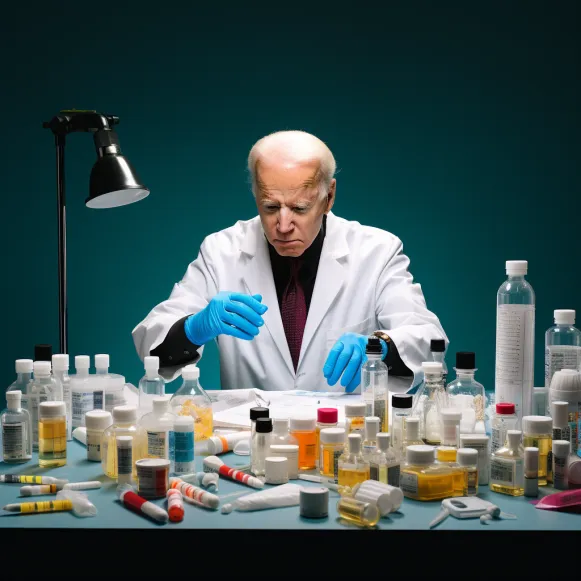Biden administration’s limit on drug industry middlemen backfires, pharmacists say

Pharmacists say the Biden administration’s first major step toward imposing limits on pharmacy benefit managers, who act as the drug industry’s price negotiators, is backfiring. Instead, it is exacerbating the problems of the independent drugstores it was supposed to help.
PBMs have long taken a fee from pharmacies weeks or months after they dispense a drug. A new rule governing Medicare’s drug program goes into effect on January 1 and requires PBMs to collect the majority of their “performance fees” at the time prescriptions are filled.
According to the Medicare Payment Advisory Commission, an agency created to advise Congress on the program for people 65 and older or with disabilities, clawbacks have increased from about $9 million in 2010 to $12.6 billion in 2021.
Although insurers claim that the fees allow them to charge lower premiums, performance fees have increased Medicare patients’ prescription costs at the pharmacy counter by hundreds of millions of dollars.
According to Ronna Hauser, vice president of the National Community Pharmacists Association, which represents independent drugstores, pharmacist groups supported the Medicare rule change but did not anticipate the PBMs’ response, which has been to demand they accept new contracts with draconian cuts to their payments for dispensing medicines. If pharmacies refuse the contracts, they risk losing Medicare customers to the same massive PBM conglomerates that have been absorbing a growing share of the pharmacy business in recent years.
PBMs are at the heart of the drug supply chain in the United States, where they claim to negotiate lower prices for insurers, including Medicare, as well as employers and their employees. However, the organizations are despised by independent drugstores, drugmakers, and patients alike, who accuse them of siphoning money from the world’s most expensive health-care system while adding no value.
PBM practices even put pressure on national chains that aren’t part of the conglomerates, such as Rite Aid, Kroger, and Walgreens. Even CVS Health, which owns one of the top three PBMs, has closed stores or reduced staff as it pushes customers to use mail-order pharmacy services.
The strain on in-store pharmacists and technicians has resulted in a series of walkouts by CVS and Walgreens employees this fall, who claim that tight staffing has caused burnout and jeopardized patient safety.
Misery for small pharmacies
When a pharmacy fills a prescription under the current system, the PBM tells it how much the patient owes and how much the PBM will pay the pharmacy. The PBM collects these payments and then sends a check. According to Doug Hoey, CEO of the National Community Pharmacists Association, the PBM will frequently deduct a performance fee from the pharmacy.
“When you’re filling the prescription, the PBM tells you the patient pays $20 for this drug, we’ll pay you $100,” Hoey went on to say. “As a pharmacist, I say, OK, I’ll take $120 for a drug that cost me $110 from the wholesaler.” The PBM then says three months later, ‘Actually, I’m only going to pay you $83.’ So I lost $17 on the sale and have no recourse.”
Patient adherence is one performance indicator. If patients do not take all of their medications, pharmacists may be fined for poor performance, even though they have no control over the patient’s actions. According to Hoey, pharmacists are sometimes penalized for the prescribing physician’s errors.
According to two independent pharmacists who received the documents, PBM giant Express Scripts sent out confidential contracts in early fall announcing that in 2024 it will pay pharmacies roughly 10% less than what they typically pay to buy wholesale brand-name drugs — meaning they could lose money on every prescription they fill. They refused to share the contracts due to nondisclosure agreements with Express Scripts.
Express Scripts stated in a statement that “our reimbursement rates to pharmacies for brand drugs vary based on a number of factors.” The company claimed that nearly 90% of the country’s 20,000 or so independent pharmacies had agreed to its terms.
Kare Drugs, which operates two pharmacies in New Mexico, was among those who declined the Express Scripts contract. As a result, the pharmacy is “preparing for the hardest part, which will potentially be transferring patients away,” according to owner Ashley Seyfarth.
According to Ben Jolley, a Salt Lake City pharmacist and consultant to other independent pharmacists, seniors who are currently enrolling in Medicare plans for next year may be confused when they discover that their insurance will no longer allow them to pick up medications at their usual pharmacy. Jolley estimates that his pharmacy will lose at least 100 customers as a result of his refusal to sign a contract with a large PBM.
A double whammy
Pharmacies will face a double whammy in the first months of 2024. PBMs will pay them less for the drugs they dispense, and pharmacies will be subject to clawbacks for drugs dispensed in the fourth quarter of 2023.
The rule change, which took effect on January 1, was intended in part to relieve Medicare patients, who frequently pay a fixed percentage of a drug’s price as a copayment. This copay is determined by the price the drug plan or PBM promises the pharmacy at the time of purchase. However, the clawbacks have resulted in patients overpaying by hundreds of millions of dollars, according to Hoey. This is because, after performance fees were deducted, their copays at the counter were a higher percentage of the drug’s final pharmacy price.
Seyfarth, who said she paid more than $500,000 in PBM fees last year, said her pharmacy was devising new revenue streams to deal with the impending squeeze, such as charging patients for delivery services and launching an all-cash concierge clinic.
Some pharmacies are putting money aside or taking out short-term loans to cover losses in the first few months of 2019. “I’m hoping we’ve made the right calculations and will get through this,” Marc Ost, co-owner of Eric’s Rx Shoppe in Horsham, Pennsylvania, said.
The rule’s unintended consequences are likely to exacerbate the problems of community pharmacists, who are finding it increasingly difficult to stock the most popular, expensive new drugs, according to Hauser.
Integrated PBM-insurance companies, particularly UnitedHealth Group, CVS Health, and Cigna, each of which is made up of a major insurer, a PBM, and other companies, have seen an increase in revenue from specialty pharmacy drugs, which account for more than half of all drug spending in the United States.
These behemoth corporations have negotiating power with drugmakers, allowing them to sell a diabetes drug like Ozempic (marketed as Wegovy for weight loss) for around $900 per month. “An independent pharmacy can’t even buy it at that price,” Hauser went on to say. “If they dispense Ozempic, they are losing money.”
Express Scripts has stated its desire to assist independent pharmacies in surviving, according to Hoey, but has yet to respond to a June letter in which he requested that the 2023 clawbacks be phased in over a 12-month period. CMS stated this month that it “strongly recommends” but does not require PBMs to develop payment plans for pharmacies.
In a press release, Express Scripts said that it was “committed to reimbursing pharmacies fairly, ensuring Medicare beneficiaries have safe, quality pharmacies in their network, and giving beneficiaries all available discounts at the pharmacy counter.”
Following a slew of hearings and an ad campaign by drugmakers, Senate and House committees have advanced bipartisan legislation to tighten controls on PBMs.According to Julie Allen, a law firm lobbyist representing the National Association of Specialty Pharmacy, Senate Finance Committee bills would require the Department of Health and Human Services to issue rules ensuring that PBM payments to pharmacies and other contract terms are reasonable, and that PBMs no longer impose unfair pharmacy performance requirements.
“These statutory changes are essential to addressing problems with the Medicare Part D program and to saving specialty pharmacies and other pharmacies,” she wrote in a follow-up email.





